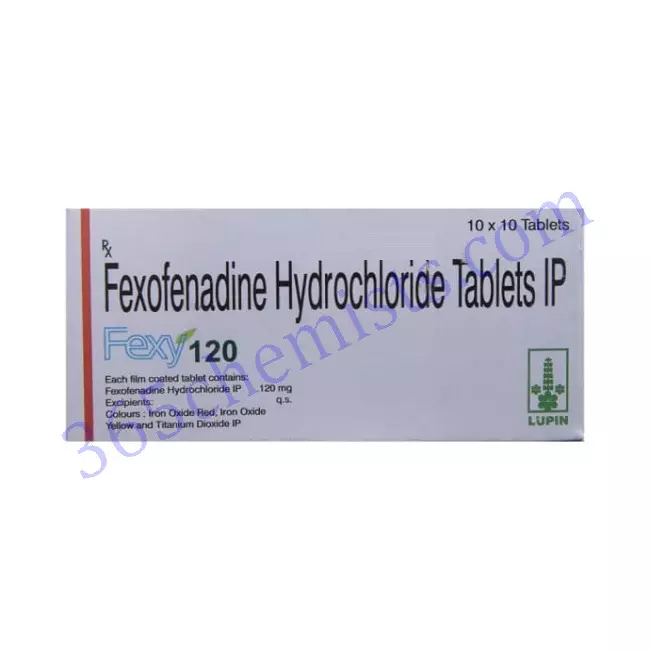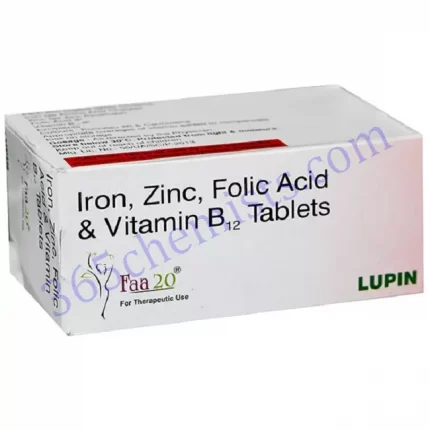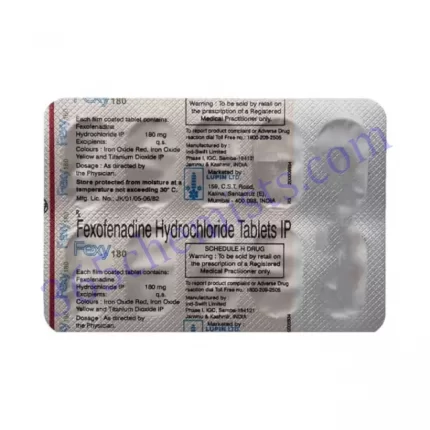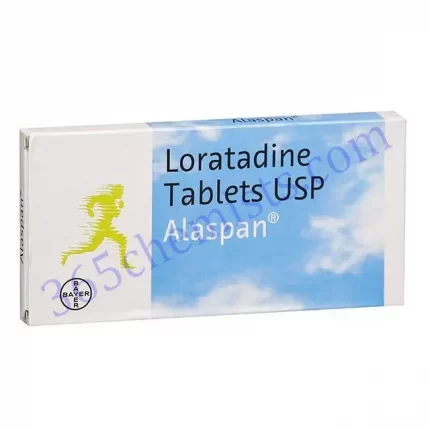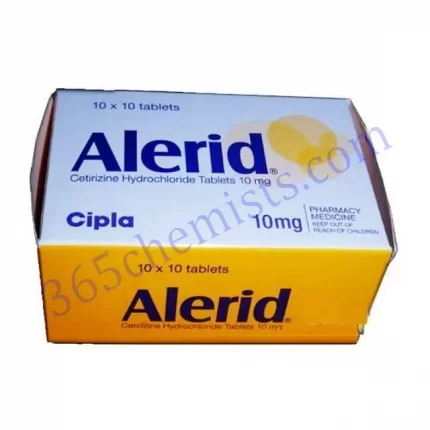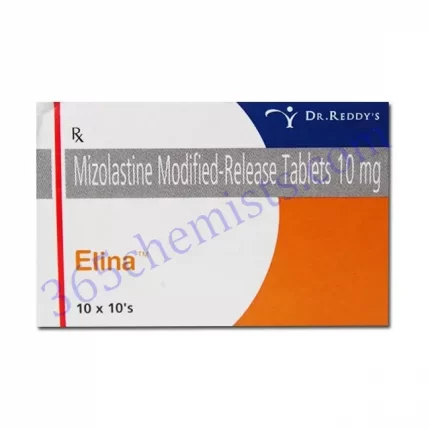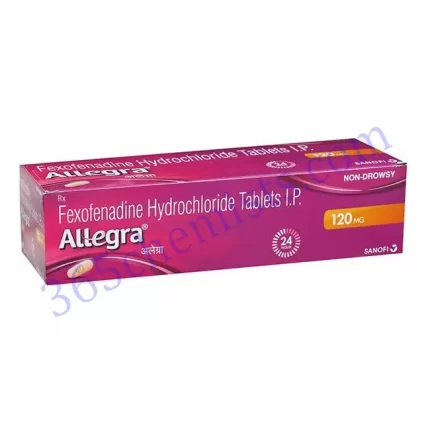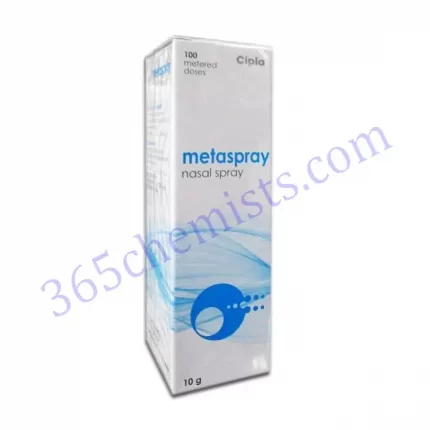Fexy 120mg Tablet
A common drug for treating allergic diseases including hay fever and hives is Fexy 120mg Tablet. Fexofenadine, the medicine’s active component and a member of the antihistamine drug class, is present in it. Histamine, a chemical in the body that triggers allergic reactions, is blocked by fexofenadine in order to work. This improves people’s quality of life by reducing symptoms like sneezing, itching, runny noses, and watery eyes.
How Fexy 120mg Tablet Works
By specifically inhibiting the H1 histamine receptors in the body, Fexy 120mg Tablets function. The typical symptoms of allergies are brought on by the production of histamine during an allergic reaction. Fexofenadine inhibits these receptors, preventing histamine from attaching to them and lessening the allergic reaction. This provides symptom relief and comfort for allergy discomfort.
Dosage and Administration
It is customary to take a Fexy 120mg Tablet orally, with or without food. The specific ailment being treated, as well as the patient’s reaction to the medicine, will determine the exact dosage and length of the course of treatment. It’s crucial to adhere to the directions given by your doctor or those listed on the product label. Unless directed otherwise by a healthcare provider, do not take more than the suggested dose.
Possible Side Effects
Although Fexy 120mg Tablet is mostly well accepted, some people may experience some adverse effects, just as with other drug. Headaches, sleepiness, dry mouth, and gastrointestinal disorders like nausea or stomach pain are examples of common adverse effects. These negative effects are often short-lived, mild, and get better as your body gets used to the medication. It is advised to speak with your doctor if any of these adverse effects worsen or persist.
Serious allergic responses can happen on occasion. If you have symptoms like a rash, itching, swelling, extreme vertigo, difficulty breathing, or tightness in your chest, seek medical help right once. These reactions necessitate rapid medical assessment and care.
Interactions with Other Medications
All of the medications you are taking, including prescription, over-the-counter, and herbal supplements, should be disclosed to your healthcare physician. Fexofenadine and some drugs may interact, reducing or raising the effectiveness or likelihood of adverse effects. Examples include erythromycin, ketoconazole, and several antacids that contain aluminium or magnesium hydroxide. Your healthcare professional can advise you on possible interactions and suggest the best course of action for management.
Related Product
Fexy 120mg Tablet
Fexy 180mg Tablet
Special Considerations
Generally speaking, Fexy 120mg Tablet is deemed safe and effective for use by adults and children older than 12 years old. Prior to giving the drug to youngsters, especially those under the age of 6, it is crucial to speak with a medical expert. Based on the child’s age, weight, and medical history, a healthcare professional can offer the best advice regarding the safety and efficacy of fexofenadine in paediatric populations.
Women who are pregnant or nursing should also consult a doctor before using Fexy 120mg Tablet. While there aren’t many research on pregnant or nursing women, it’s still vital to consider the pros and cons before making a choice.
Warnings and Precautions
Prior to taking Fexy 120mg Tablet, it is crucial to take into account the following warnings and precautions:
Allergic Reactions: It’s crucial to avoid using the drug if you have a known allergy or hypersensitivity to fexofenadine or any other component. If you have symptoms of an allergic response, such as a rash, itching, swelling, severe dizziness, or trouble breathing, you should get medical help right once.
Medical Conditions: Be sure to let your doctor know if you have any existing medical conditions, especially renal disease or any other long-term illnesses. In such circumstances, dosage adjustments or different treatment alternatives can be required.
Breastfeeding and pregnancy: Before taking a Fexy 120mg Tablet, talk to your doctor if you are breastfeeding or pregnant. The safety of fexofenadine in these circumstances has received limited research; your healthcare professional can advise you on the best course of action.
Driving and Operating Equipment: Fexy 120mg Tablet may make some people drowsy. Avoid driving or operating machinery if you experience sleepiness or any other side effects that could impact your ability to do so until you know how the medicine affects you.
Avoid drinking while taking Fexy 120mg Tablet because it may raise the chance of adverse effects like sleepiness and dizziness.
Other Medications: Be sure to let your doctor know about all of your current medications, including prescription, over-the-counter, and herbal supplements. Fexofenadine and other drugs may interact, potentially resulting in side effects or diminished effectiveness. Your healthcare professional can advise you on possible interactions and suggest the best course of action for management.
Conclusion
An efficient antihistamine drug for the treatment of allergic disorders is Fexy 120mg Tablet. It reduces symptoms including sneezing, itching, and watery eyes by inhibiting histamine receptors. Although generally well tolerated, it is crucial to adhere to the dosage and safety instructions advised by your healthcare professional. Consult your healthcare professional for specific advice if you have any worries or inquiries. To guarantee its safe and efficient use in controlling your allergies, Fexy 120mg Tablet should only be administered under medical supervision.
An effective treatment for allergic diseases, Fexy 120mg Tablet relieves symptoms like sneezing, itching, and watery eyes. It lessens the discomfort brought on by allergies by inhibiting the action of histamine. Even though side effects are frequently minor and transient, it’s nevertheless vital to be aware of potential reactions and seek medical attention as needed. Fexy 120mg Tablet can help you control your allergies and enhance your quality of life with proper use and advice from your healthcare practitioner.

